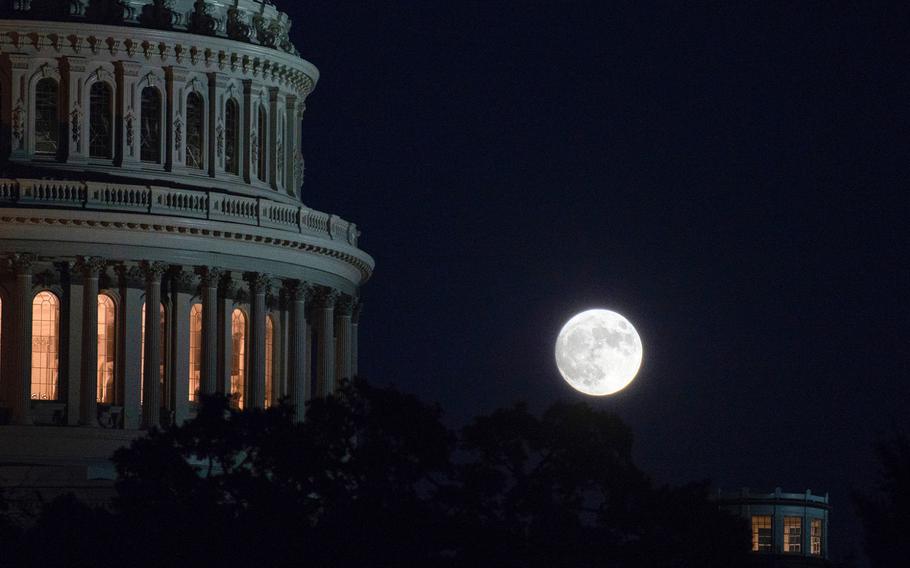
A full moon rises over the nation's capitol on Oct. 30, 2020, with the U.S. Capitol in the foreground. Government funding lapses at midnight on Friday, Dec. 18, 2020, and a partial, low-impact shutdown would ensue if Congress fails to pass a stopgap spending bill before then. (Carlos Bongioanni/Stars and Stripes)
Stars and Stripes is making stories on the coronavirus pandemic available free of charge. See other free reports here. Sign up for our daily coronavirus newsletter here. Please support our journalism with a subscription.
WASHINGTON — The House on Monday voted to override President Donald Trump’s veto of the $740.5 billion defense bill that boosts pay and benefits for troops and adds care for thousands of Vietnam-era veterans who were exposed to Agent Orange.
In a 322-87 vote, the Democrat-controlled House successfully rebuked Trump’s rejection of the 2021 National Defense Authorization Act, which sets annual spending and policy priorities for the Pentagon. The bill originally passed both chambers of Congress by veto-proof majorities.
“It’s the exact same bill, not a comma has changed,” Rep. Mac Thornberry of Texas, the ranking Republican on the House Armed Services Committee, said on the House floor ahead of the vote. “The president has authorized his constitutional prerogative. Now...it’s up to us.”
The House vote tees Congress up for the first veto override of Trump’s presidency in his last days in office. The Republican-controlled Senate is expected to vote Tuesday on overriding the veto, which will require a two-thirds vote. The bill was passed in the Senate in an 84-13 vote earlier this month. The initial House vote was 335-78.
“My intention was and is to ensure the Senate continues fulfilling our obligation to the men and women of our armed forces,” Senate Majority Leader Mitch McConnell, R-Ky., said on the Senate floor last week urging the president not to veto the NDAA.
Trump primarily vetoed the legislation because it does not include a last-minute demand to repeal Section 230, a law that protects social media companies from liability for what is posted on their sites by third parties. The idea is backed by Republicans on Capitol Hill, but as a separate bill because it doesn’t fall into the jurisdiction of military policy.
“Both parties have put together an incredible piece of legislation,” Rep. Adam Smith, D-Wash., chairman of House Armed Services Committee, said ahead of the vote. “That’s why it passed so overwhelmingly just a couple of weeks ago. The president vetoed this because of something that was never going to be in the bill, something totally unrelated to national security and something that we were not going to do in any event. There is literally no reason to veto this bill for the reasons the president did.”
Sen. Lindsey Graham, R-S.C., one of Trump’s closest allies on Capitol Hill, tweeted last week that he would not vote to override the veto unless there is a provision to “wind-down” Section 230. Graham was one of three senators who did not originally vote on the NDAA.
Trump also had objections to a measure that would rename military bases that honor Confederate leaders and provisions that restrict a quick withdrawal of troops from Afghanistan and Germany.
"Unfortunately, the act fails to include critical national security measures, includes provisions that fail to respect our veterans and our military's history, and contradicts efforts by my administration to put America first in our national security and foreign policy actions. It is a 'gift' to China and Russia,” Trump wrote in his veto message to Congress.
Among the critical measures included in the NDAA, the bill would authorize a 3% pay raise for troops, an increase of more than 5,000 military troops, and provide funding for a new initiative aimed at checking China’s military power in southeast Asia.
The NDAA also includes a measure that approves benefits for Vietnam War veterans suffering from bladder cancer, hypothyroidism and Parkinson’s-like symptoms — conditions thought to be caused by exposure to the chemical herbicide Agent Orange. The provision would add the diseases to the VA presumptive list, which lowers the amount of proof veterans must provide in order to receive VA benefits.
Lawmakers named the 2021 NDAA in honor of retiring Rep. Mac Thornberry, R-Texas. Thornberry has long been a force on the House Armed Services Committee, serving as its chairman and its ranking Republican.
In addition to a military pay boost, increased force strength and the new $2.2 billion Pacific Deterrence Initiative, the bill also places new restrictions on a president’s authority to withdraw troops from Germany and Afghanistan. It also funds military training, new weapons systems and construction projects at bases across the world.
The passage in both chambers marked the 60th consecutive year that Congress approved the defense bill before the end of the calendar year.
Sen. Jim Inhofe, R-Okla., the chairman of the Senate Armed Services Committee, said the NDAA is among the few examples of bipartisanship in an increasingly divided Congress and signaled he expected a Trump veto to be overruled.
beynon.steven@stripes.com Twitter: @StevenBeynon